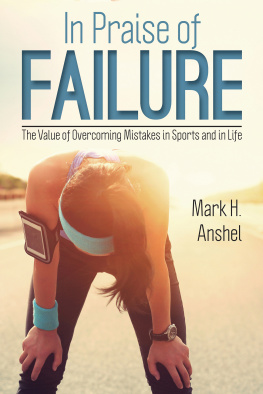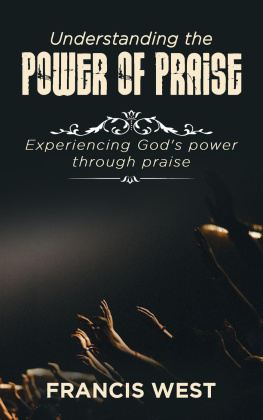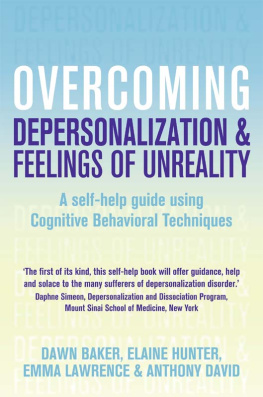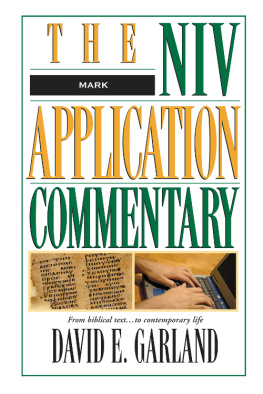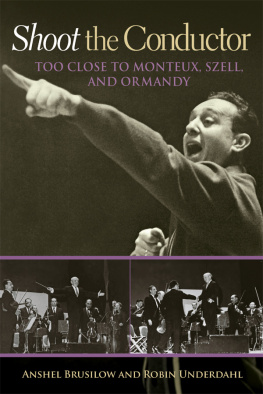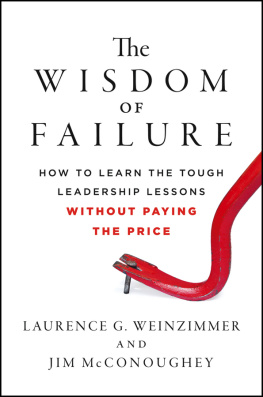Mark H. Anshel - In Praise of Failure: The Value of Overcoming Mistakes in Sports and in Life
Here you can read online Mark H. Anshel - In Praise of Failure: The Value of Overcoming Mistakes in Sports and in Life full text of the book (entire story) in english for free. Download pdf and epub, get meaning, cover and reviews about this ebook. year: 2016, publisher: Rowman & Littlefield Publishers, genre: Home and family. Description of the work, (preface) as well as reviews are available. Best literature library LitArk.com created for fans of good reading and offers a wide selection of genres:
Romance novel
Science fiction
Adventure
Detective
Science
History
Home and family
Prose
Art
Politics
Computer
Non-fiction
Religion
Business
Children
Humor
Choose a favorite category and find really read worthwhile books. Enjoy immersion in the world of imagination, feel the emotions of the characters or learn something new for yourself, make an fascinating discovery.
- Book:In Praise of Failure: The Value of Overcoming Mistakes in Sports and in Life
- Author:
- Publisher:Rowman & Littlefield Publishers
- Genre:
- Year:2016
- Rating:4 / 5
- Favourites:Add to favourites
- Your mark:
- 80
- 1
- 2
- 3
- 4
- 5
In Praise of Failure: The Value of Overcoming Mistakes in Sports and in Life: summary, description and annotation
We offer to read an annotation, description, summary or preface (depends on what the author of the book "In Praise of Failure: The Value of Overcoming Mistakes in Sports and in Life" wrote himself). If you haven't found the necessary information about the book — write in the comments, we will try to find it.
Mark H. Anshel: author's other books
Who wrote In Praise of Failure: The Value of Overcoming Mistakes in Sports and in Life? Find out the surname, the name of the author of the book and a list of all author's works by series.
In Praise of Failure: The Value of Overcoming Mistakes in Sports and in Life — read online for free the complete book (whole text) full work
Below is the text of the book, divided by pages. System saving the place of the last page read, allows you to conveniently read the book "In Praise of Failure: The Value of Overcoming Mistakes in Sports and in Life" online for free, without having to search again every time where you left off. Put a bookmark, and you can go to the page where you finished reading at any time.
Font size:
Interval:
Bookmark:
In Praise of Failure
In Praise of Failure
The Value of Overcoming Mistakes in Sports and in Life
Mark H. Anshel
Rowman & Littlefield
Lanham Boulder New York London
Published by Rowman & Littlefield
A wholly owned subsidiary of The Rowman & Littlefield Publishing Group, Inc.
4501 Forbes Boulevard, Suite 200, Lanham, Maryland 20706
www.rowman.com
Unit A, Whitacre Mews, 26-34 Stannary Street, London SE11 4AB
Copyright 2016 by Rowman & Littlefield
All rights reserved . No part of this book may be reproduced in any form or by any electronic or mechanical means, including information storage and retrieval systems, without written permission from the publisher, except by a reviewer who may quote passages in a review.
British Library Cataloguing in Publication Information Available
Library of Congress Cataloging-in-Publication Data
Names: Anshel, Mark H. (Mark Howard), author.
Title: In praise of failure : the value of overcoming mistakes in sports and in life / Mark H. Anshel.
Description: Lanham, Maryland : Rowman & Littlefield, 2016. | Includes bibliographical references and index.
Identifiers: LCCN 2015037827| ISBN 9781442251571 (cloth : alk. paper) | ISBN 9781442251588 (ebook)
Subjects: LCSH: SportsPsychological aspects. | AthletesPsychology. | Failure (Psychology) | Life skills.
Classification: LCC GV706.4 .A568 2016 | DDC 796.01/9dc23 LC record available at http://lccn.loc.gov/2015037827
 The paper used in this publication meets the minimum requirements of American National Standard for Information SciencesPermanence of Paper for Printed Library Materials, ANSI/NISO Z39.48-1992.
The paper used in this publication meets the minimum requirements of American National Standard for Information SciencesPermanence of Paper for Printed Library Materials, ANSI/NISO Z39.48-1992.
Printed in the United States of America
This book is dedicated to the memory of my parents, Bernard and Rochelle Anshel, who provided me with the opportunities to learn, to overcome adversity, and to successfully meet lifes daily challenges. They allowed me to fail without humiliationin school, in sport, and at workso that I could build on, learn from, and grow as a result of these failures. Success eventually came, not due to good luck, favorable conditions, or money, but through hard effort. I thank my parents for teaching me to learn and live by my most important values and beliefs about how to live and succeed. These values included integrity, family, health, faith, love, sensitivity, character, happiness, genuineness, commitment, kindness, respect for others, empathy, and honesty. I also acknowledge their patience in providing me with the opportunities to experience a high quality education and to develop the necessary skills to write and teach. But perhaps the most gratifying quality they gave me was the desire and drive to make a difference in the lives of others. And that is a legacy about which I will always be most proud.
Preface
N ot only is failure in all areas of human performance inevitable in an imperfect world, it is actually essential to succeeding and performing at the highest level. I have failed on numerous occasions and in different contexts throughout my life. These personal failures have led to a very successful career. Despite suffering from not meeting the expectations of others, poor school grades (with consequential parental reprimands to make matters worse), and not succeeding at the elite level in sports, I can now objectively reflect on the tremendous opportunities that failure provided.
There are two main objectives of this book. The first objective is to improve our understanding of the value of failure as part of the process of growing and achieving, particularly with respect to all areas of human performance, such as sport, exercise, the artsacting, dancing, musical instrumentsand work settings. What we label failure is not, in fact, failure at all. Instead, what is often called failure consists of not meeting goals or expectations, or not achieving perfection. These undesirable outcomes are a component of learning, improving, and eventually reaching our optimal performance. We are wrong by juxtaposing the term and concept of losing with failure . Losing is an outcome of competition, not a component of failure. Thus, we often misuse the word failure , especially in achievement settings.
The second objectiv e of this book is that weas individuals, groups, and culturesneed to understand and accept failure, that is, not meeting performance expectations, as an integral component of achieving success in all areas of life. There is no success without failureboth perceived failure (i.e., the performers own view and interpretation) and actual failure (i.e., an objective measure of not achieving a favorable or desirable outcome). Humans learn from mistakes as part of the processes of growth and development. Humans are imperfect; errors are inevitable. So we must use errors to learn and improve our performance. Our mission is not to eliminate mistakes in life. Instead, we should embrace our mistakes as building blocks toward eventual achievement and success. We need to interpret our inevitable less-than-perfect performance outcomes as what separates humans from machines. Errors give us our humanity and fulfill our inherent need to achieve. The worst possible response to making mistakes is to react in a hostile manner because we expected perfection.
The concepts of failure and success need to be defined and applied to sport and exercise settings. So-called failure is far more desirable and positive than many sport leaders, parents, performers, coaches, and athletes typically acknowledge. The best, highest, and most successful athletes have one characteristic in common: they failed often, using their failure to learn, improve, and eventually achieve at the highest level. To our most accomplished performers in sport and other performance areas, such as the arts, failure was a gift.
Introduction
Defining Failure and Success in Sport
Anyone who has achieved anything great, anyone who has changed the world, has at some point made a choice to embrace failure instead of fighting it.
Zo B (2013), life coach and founder of SimpleLifeStrategies
T he concept of failure is both foreign and unacceptable in many cultures. As one high school coach told my team, Only losers fail, and we dont play this game to lose. Perhaps not surprisingly, therefore, the fear of failing remains one of the most paralyzing mind-sets (and dispositions) in competitive sport. Sports performers can become paralyzed with fear when asked to engage in challenging tasks that can lead to the perception of failurenot achieving the performers goals. One outcome of fearing failure is a related concept called choking , in which a person has previously demonstrated high skill, but fails to exhibit similarly competent performance under high-pressure conditions.
For some athletes the thought of failure induces enormous fear and anxiety. Fear of what? Anxiety caused by what factors? Fear of disappointing otherscoaches, teammates, spectatorsand of not meeting personal goals; anxiety caused by worrying about not meeting performance expectations. To the athlete who fears failure, it is better not to attempt a task or be in a situation that might not be successful. Their self-talk is, If I dont try, I cant fail. These athletes fear striking out with runners on base. They fear any situation that induces worry (anxiety) and possible embarrassment. How do high-quality athletes overcome these types of situations? How do they overcome fear? Chapter 6 on coping with failure will address this issue. Sometimes the underachieving athletes do not perform at their previous best and do not grow and achieve to their potential. This book is written for them.
Failure is an inevitable outcome that everyone experiences, particularly athletes in competitive situations. It is not failure that determines eventual success; it is how we perceive and react to failure. Athletes are in the unique position of having their competence tested with each competitive event. Media scrutiny often exacerbates the emotional and psychological effect of experiencing failure. The polar opposite of failuresuccessis desirable but less achievable in the short term. What is important to realize is that life consists of contrasts. There is no right unless there is a left, there is no up unless there is a down, no good unless there is bad. Perhaps the central theme of this book is that we cannot experience success unless we have failed, no matter how failure is defined and perceived.
Next pageFont size:
Interval:
Bookmark:
Similar books «In Praise of Failure: The Value of Overcoming Mistakes in Sports and in Life»
Look at similar books to In Praise of Failure: The Value of Overcoming Mistakes in Sports and in Life. We have selected literature similar in name and meaning in the hope of providing readers with more options to find new, interesting, not yet read works.
Discussion, reviews of the book In Praise of Failure: The Value of Overcoming Mistakes in Sports and in Life and just readers' own opinions. Leave your comments, write what you think about the work, its meaning or the main characters. Specify what exactly you liked and what you didn't like, and why you think so.

